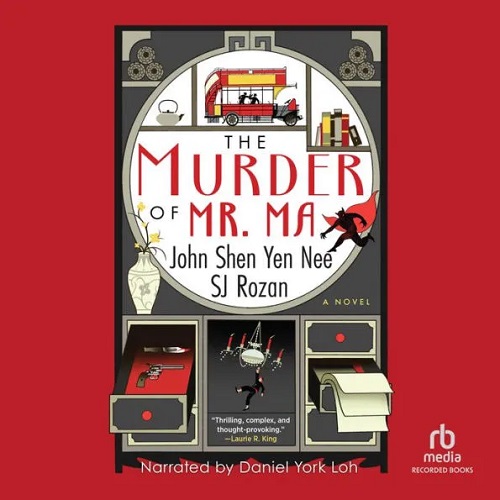 The Murder of Mr. Ma (Dee & Lao, #1) by John Shen Yen Nee, S.J. Rozan
The Murder of Mr. Ma (Dee & Lao, #1) by John Shen Yen Nee, S.J. Rozan Narrator: Daniel York Loh
Format: audiobook, eARC
Source: supplied by publisher via Edelweiss, supplied by publisher via Libro.fm
Formats available: hardcover, paperback, ebook, audiobook
Genres: historical fiction, historical mystery
Series: Dee & Lao #1
Pages: 312
Length: 8 hours and 24 minutes
Published by Recorded Books, Soho Crime on April 2, 2024
Purchasing Info: Author's Website, Publisher's Website, Amazon, Barnes & Noble, Kobo, Bookshop.org, Better World Books
Goodreads
For fans of Guy Ritchie's Sherlock Holmes films, this stunning, swashbuckling series opener by a powerhouse duo of authors is at once comfortingly familiar and tantalizingly new.
Two unlikely allies race through the cobbled streets of 1920s London in search of a killer targeting Chinese immigrants.
London, 1924. When shy academic Lao She meets larger-than-life Judge Dee Ren Jie, his life abruptly turns from books and lectures to daring chases and narrow escapes. Dee has come to London to investigate the murder of a man he’d known during World War I when serving with the Chinese Labour Corps. No sooner has Dee interviewed the grieving widow than another dead body turns up. Then another. All stabbed to death withg a butterfly sword. Will Dee and Lao be able to connect the threads of the murders—or are they next in line as victims?
John Shen Yen Nee and SJ Rozan’s groundbreaking collaboration blends traditional gong'an crime fiction and the most iconic aspects of the Sherlock Holmes canon. Dee and Lao encounter the aristocracy and the street-child telegraph, churchmen and thieves in this clever, cinematic mystery that’s as thrilling and visual as an action film, as imaginative and transporting as a timeless classic.
My Review:
It can be considered both sad and ironic that Ma Ze Ren had left his native China in pursuit of fortune and adventure among the Chinese Labour Corps in the trenches of World War I, survived, immigrated to London and opened a successful shop dealing in Chinese antiquities – having seemingly attained all that he had originally sought – only to be killed in the midst of his shop by means of one of those self-same antiquities he intended to sell.
When they both served in the Labour Corps, Ma Ze Ren and several of his compatriots had come to an agreement with the man who served as the liaison between the Chinese Labour Corps members and the British officers who used them as cannon fodder, Judge Dee Ren Jie, that Dee would make arrangements to send their bodies back home if the chances of war required such service.
The war may be long over when this story opens in 1924, but that contract still holds Judge Dee, so he has come to London to take care of Ma’s final arrangements. But before he can even begin, Dee is taken up in the midst of a labor riot along with other Chinese men protesting for fair wages and treatment in a city that considers them something less than fully human.
Which is where the chronicler of this tale, scholar and author Lao She, comes into the tale. Dee needs to be out of jail before an enemy realizes that he has this nemesis in his clutches. Bertrand Russell wishes to help his friend Dee without getting his own name attached to this scandalous business.
And Lao She is bored out of his mind – even if he is unwilling to admit it to himself – spending his days teaching Chinese language and literature to students who have no love or care for the language or the people who speak it, merely a desire to get a leg up on their fellows in the commercial opportunities opening up in a modernized China.
Lao is supposed to be clandestinely exchanged for Dee – but Lao gives away the game with every move he makes and every word he’s not supposed to be uttering. So a prison break it is, with Lao, Dee and Russell scattering along with the rest of the prisoners.
But Dee still has a mission, Lao has acquitted himself well in the melee and has acquired a taste for danger and adventure he never realized blazed within him. Reluctant partners, resistant friends, together they will uncover not one but two murder plots in a fascinating tale that takes readers from the homes of the intelligentsia to the alleys of Limehouse – with a stop among the pioneers of the silver screen along the heights and depths of its way – only to arrive frantic and breathless at one of the first principles in any investigation:
FOLLOW THE MONEY
Escape Rating A-: The Murder of Mr. Ma was the highlighted review in the online mystery/crime review newsletter First Clue several months ago, and something about that review caught my attention and held it more than long enough for me to mark the title in Edelweiss as “Highly Anticipated” and immediately grab it when my anticipation was rewarded with the availability of an eARC and later an early audiobook.
(The above is a hint. If you love mysteries, subscribe to First Clue!)
The comparison in many reviews of this book are to Holmes and Watson, particularly the Holmes played by Robert Downey Jr. in the Guy Ritchie movies – because that particular version of Holmes is considerably more active than most.
As has been confessed before, I am a sucker for a Holmes pastiche, so I would have been interested in this book on that basis alone, but I think that quick comparison sells Dee and Lao and The Murder of Mr. Ma a bit short in this particular instance.
There is a surface resemblance in that Dee is the more active and experienced investigator – with or without resorting to the martial arts – while Lao, like Watson, is the newbie at this particular game and is tasked with creating a record of the adventure rather than necessarily figuring out the solution on his own. And if this combination appeals, Barker & Llewelyn are a bit closer analog than Holmes and Watson in more ways than the initially obvious.
What takes this story up another notch or ten is that both Dee and Lao were real historical figures – who never met due to having lived centuries apart. But Lao was a Chinese scholar in London during this period in real life, while Dee was a figure out of legend whose adventures were popularized by Robert van Gulik in the mid-20th century. (So if you think Dee’s name sounds familiar, that’s most likely the reason.)
Of course, what makes any mystery is the way the case itself is laid out and investigated, and that’s where this one draws the reader in its whirlwind every bit as much as Dee pulls Lao along in his wake. Because at first it seems as if the murder was a result of the prejudice and anti-Chinese sentiment that Dee, Lao and their countrymen face on every side in London in 1924, not helped at all by the popular “Yellow Peril” movies that play on and sensationalize the British fear of “the other”.
But the more Dee and Lao, with the able assistance and frequent succor of Dee’s friend Hoong, search for clues and motives, the less that simple but terrible conclusion feels like the entirety of the answer – not that it doesn’t underlay that answer but it’s just not the whole of the thing. Particularly as that answer is made even more elusive by Lao’s struggles with his pride and his naivete, and Dee’s ongoing attempts to extract himself from his opium addiction.
This is a mystery with layers surrounding layers, wheels within wheels, two investigators neither of whom are having their best day and criminals whose overweening pride finally gets in their way. And it’s marvelous.
The audiobook, narrated by Daniel York Loh, was a delight, but as is so often the case, I switched to text near the end because I couldn’t figure it out either and I just HAD to know. I have two and only two quibbles with the whole thing. I REALLY wanted Lao to get over his mooning over his landlady’s daughter because it was obvious from the beginning that he was deluding himself about his prospects and almost willfully blind to the obvious. His vain hopes and how thoroughly they were going to be dashed took a lot of audio time. My other quibble – a much bigger one – is that the short story that introduced this fascinating pair “The Killing of Henry Davenport” in the Ellery Queen Mystery Magazine does not appear to be available online, and that there’s no second book firmly fixed on the horizon. Dee’s and Lao’s investigations NEED to be a series. So much. So very much.
Which means that I leave this review pleased that Lao finally let himself get hit with the clue-by-four regarding Miss Wendell, and that rumors of a second book leave me with hope on that front as well.

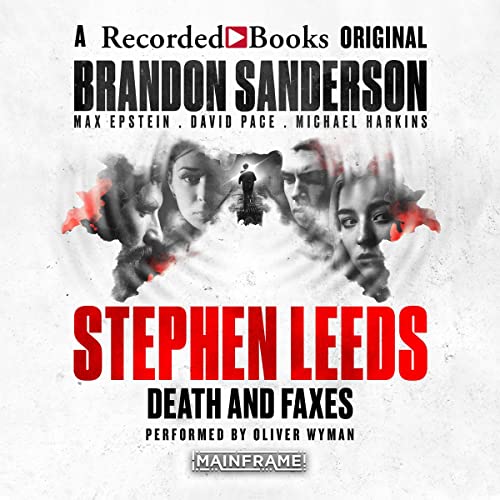 Stephen Leeds: Death and Faxes by
Stephen Leeds: Death and Faxes by 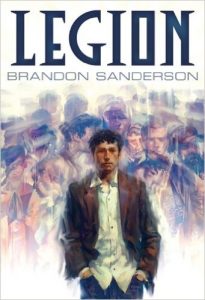 The case that finds Stephen Leeds in this audio-only entry in the
The case that finds Stephen Leeds in this audio-only entry in the 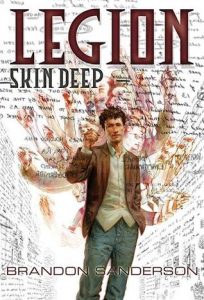 It’s only the beginning, because Stephen is determined to get to the bottom of this case, following a trail of victims around the country even as the structure of his increasingly fragile mental landscape falls into tatters.
It’s only the beginning, because Stephen is determined to get to the bottom of this case, following a trail of victims around the country even as the structure of his increasingly fragile mental landscape falls into tatters.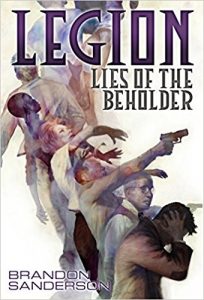 So I wasn’t expecting to see Stephen Leeds again when I found this audio-only entry in the series. An entry that doesn’t occur AFTER
So I wasn’t expecting to see Stephen Leeds again when I found this audio-only entry in the series. An entry that doesn’t occur AFTER 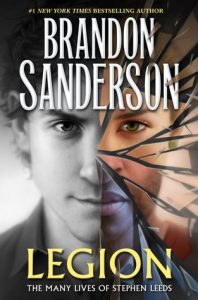 So, a whole lot of mixed feelings, leaving me with the conclusion that fans of the series, like me, will probably enjoy the trip down memory lane to visit Stephen and his aspects again. (However, the comment in the blurb about Stephen being perfectly sane but his hallucinations all being quite mad isn’t merely a bit off – it’s completely wrong. A fair number of his aspects are quirky and/or eccentric, but none of them are actually ‘mad’, and neither is Stephen Leeds. His coping mechanism is just eccentric and sometimes expensive, but works for him and does no harm to anyone else. There are worse ways to get by.)
So, a whole lot of mixed feelings, leaving me with the conclusion that fans of the series, like me, will probably enjoy the trip down memory lane to visit Stephen and his aspects again. (However, the comment in the blurb about Stephen being perfectly sane but his hallucinations all being quite mad isn’t merely a bit off – it’s completely wrong. A fair number of his aspects are quirky and/or eccentric, but none of them are actually ‘mad’, and neither is Stephen Leeds. His coping mechanism is just eccentric and sometimes expensive, but works for him and does no harm to anyone else. There are worse ways to get by.)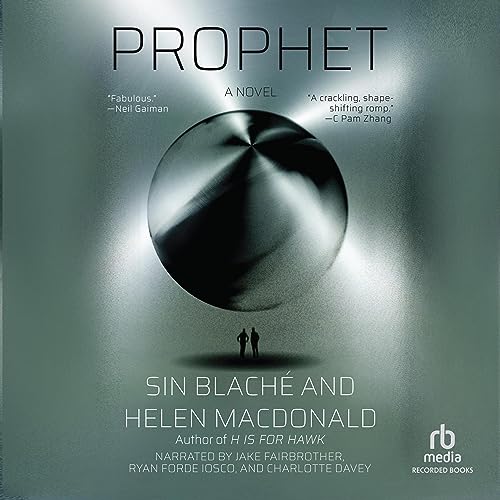 Prophet by
Prophet by